Student Blog
Fieldwork
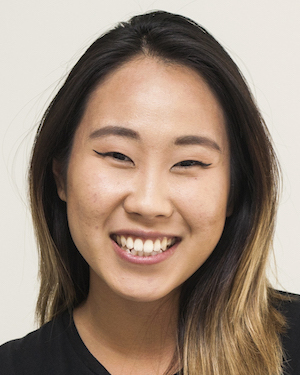
Fieldwork Meltdown ⟩
October 18, 2018, by Joyce
Fieldwork
What is fieldwork anyways?
If you’ve talked to OTs or OTS you’ve probably heard this term thrown around. Overall, fieldwork is an out-of-classroom experience to practice your clinical reasoning and therapeutic skills under the appropriate supervision. The reason why I say “appropriate supervision” is because they may not always be an occupational therapist.
WHAT? HOW? WHY? OMG HOW WILL I BE AN OT?
I know, I had the same thoughts running through my head. To break it down, fieldwork experiences can be categorized into two levels, Level 1 and Level 2. To be clear, for your level 2 fieldwork, you must be under the supervision of a registered and licensed occupational therapist. However, for your level 1 fieldwork, your supervisor can vary. From my own personal experience, my first “CI” (clinical instructor as we call them in the OT world . . . not white collar criminal informant) was a life skills coach at ICAN California Abilities Network, a day program for adults with intellectual disabilities. In addition, a few of my peers worked under the supervision of a physical therapist, a certified occupational therapy assistant, or even a psychologist.
While your head might be spinning and your anxiety shooting through the roof, I learned that it’s okay. For your level 1 fieldwork, the objective is to gain an understanding of the needs of the clients. While each experience varies, most students use this time to observe and discuss with their CI the needs of the clients that they encounter and what treatment plans could look like. You never know what you can learn if you keep an open mind.
For example, this last week was my full week of Level 1 fieldwork, meaning instead of going to class, I was going to my fieldwork site, Children’s Hospital of Los Angeles USC University Center of Excellence for Developmental Disabilities (CHLA UCEDD). I experienced such an enriched week of learning that varied from observing to actively participating in treatment sessions. What prepared me for this fieldwork site was my first fieldwork at ICAN working with the life skills coach. I observed the ways they worked with the clients who had Autism, Down Syndrome, or Cerebral Palsy. Even though they weren’t occupational therapists, I took that time to really engage in conversations with the clients to get a tiny glimpse of what their life and daily routine was like. This built a strong foundation of communication and interpersonal skills that translated over to my fieldwork here at CHLA UCEDD. And because my clients at ICAN were 22+, I was able to see what life can be like for the children I see at my current fieldwork. This allowed me to start that clinical reasoning as to what skills should the individual be working on throughout their childhood and adolescence in order to be as independent as possible in their emerging adulthood years.
It took me a while to understand the meaningful lessons I gained from ICAN. Honestly, I was just really bitter about the fact that I wasn’t placed at a setting with an occupational therapist. However, upon reflection, have I continued to resent my placement and closed the door on many of the wonderful conversations that took place, I wouldn’t have had that knowledge to reflect back on when interacting with clients today.
⋯
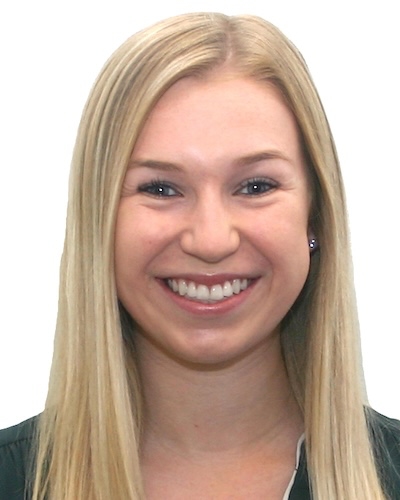
OT’s Role in Lymphedema ⟩
October 16, 2018, by Jessica P.
Classes Fieldwork
The semester is officially in full-swing and students here at USC Chan are immersing themselves in their Level I Fieldwork experiences. As part of our Level I Fieldwork, about halfway through the semester we have classes cancelled for the entire week and we get the opportunity to go to our fieldwork site for the whole week. This allows us to really see what it is like to be an OT in this practice setting. Last week, us second years had our full week and are now back on campus prepping for the second half of our semester.
As part of my adult physical rehabilitation practice immersion, my fieldwork this semester is at an outpatient oncology and lymphedema clinic at Providence Holy Cross Medical Center. If you are anything like me, you may be unfamiliar with what OT’s role in lymphedema is. My clinical instructor is a Certified Lymphedema Therapist (CLT), which is considered an advanced practice area within OT.
But wait . . . what even is lymphedema? When lymphedema occurs in oncology patients, it is called secondary lymphedema. This is when the lymph vessels aren’t able to adequately drain lymph fluid, usually from an arm or leg. Most of the patients that I see are breast cancer survivors who experience lymphedema of the arm or trunk. As part of their OT treatment, they come in for manual lymph drainage, which is a gentle massage guiding the lymph fluid towards areas where there are still good lymph nodes in the body.
OTs also have a critical role in educating and training patients on lifelong management of this chronic condition. It is complex and multi-faceted so OTs may utilize all different interventions such as kinesiotaping, low-level laser therapy, scar mobilization, cupping, and so much more.
One of the biggest things I learned throughout my full fieldwork week was how OTs really play a role in enabling a patient to advocate for themselves. Many of our patients come to us after years of experiencing lymphedema. They haven’t received the treatment they need and have given up. We have the important role of being able to give them hope again, while utilizing an evidence-based practice and allowing them to engage in their meaningful occupations again!
⋯

3 Reasons to Level 2 Out of State!! ⟩
September 6, 2018, by Joyce
Fieldwork Life Hacks
For current and prospective students alike, I would urge you to consider an opportunity to complete your level 2 fieldwork outside of sunny state California. Here’s why.
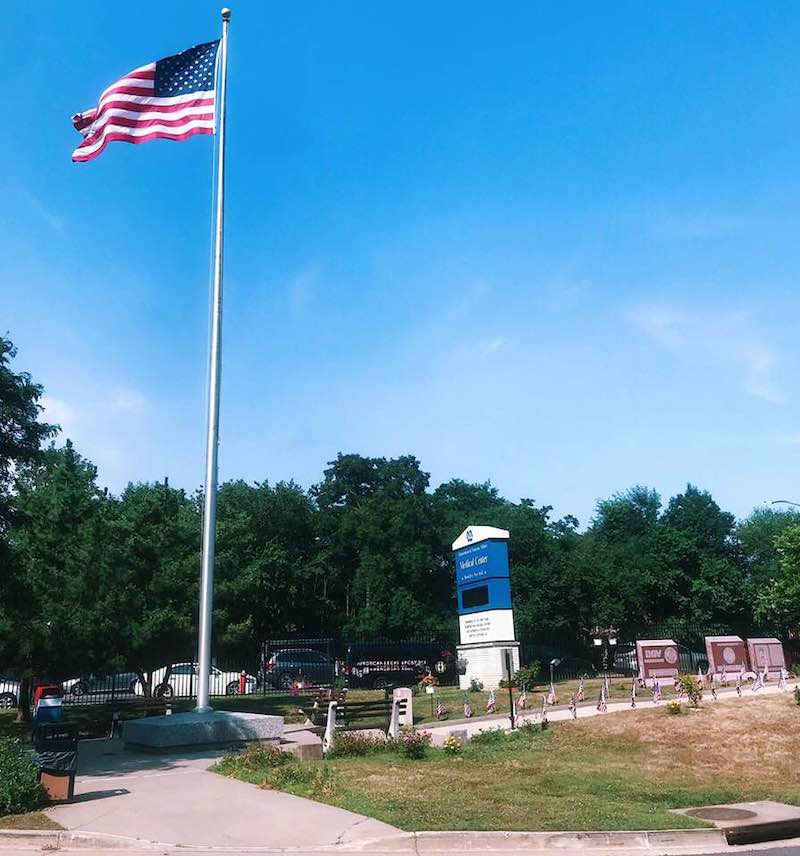
Experience a New City
This is the perfect time to travel and put yourself out there. I know it can be a scary thought (I’ve moved to two new cities already!). However, if the time isn’t now, then when? I truly believe that as students, we have the flexibility to travel without worrying about taking absence from work or using your paid time off’s. Go eat new foods, explore new restaurants, and meet great people!
Experience a New Culture
Hey, even if you’re still travelling domestically, culture varies by state and even by city. Growing up in NYC, we were always taught to grind and work hard. When I moved to Boston for my undergraduate career, the adjustment was difficult. The culture is slower paced and a lot more preppy, as if you stepped right into a J. Crew Magazine.The city is small and old yet rich with history. Now when I moved to Los Angeles, boy are the vibes different. People brunch at the weirdest times here, obsess over their dogs, and drink an unending amount of kale smoothies. I believe by working in settings outside of LA, especially if you never left LA, you get to experience various cultures and meet people from different walks of life. The more diverse your student experiences are, the more enhanced your clinical reasoning becomes and more refined your therapeutic use of self becomes.
Experience a Different OT
Having gone through two Level 1 Fieldworks and 1 Level 2, there is a difference between therapists who received their education on the west coast vs the east coast. Because my level 2 was in NYC, I had the opportunity to work with OTs and PTs who completed their degrees in New York. We bonded over deep conversations as we shared the major differences and similarities between programs. In this way, I got to understand their clinical reasoning and their experiences while at the same time sharing what I learned here at USC. Expanding your professional network within the rehabilitation field is another amazing perk of completing your fieldwork out of state!
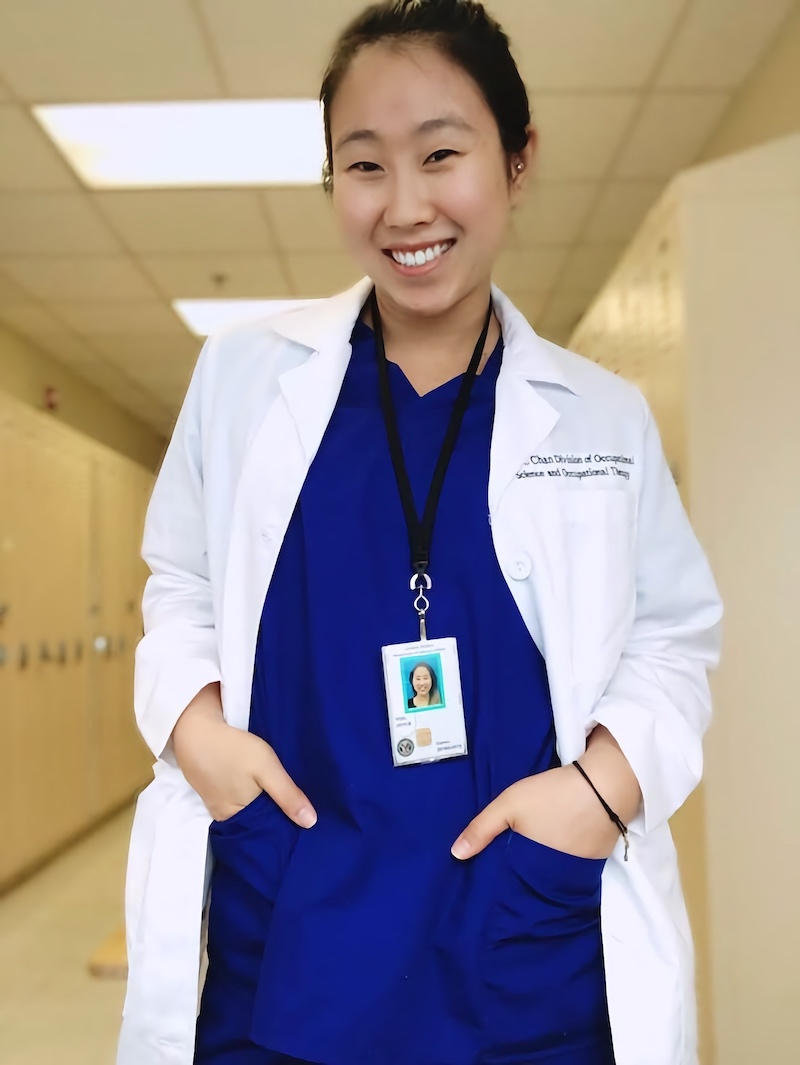
⋯

Preparing for Level I Fieldwork ⟩
September 6, 2018, by Jessica P.
Fieldwork
At USC, our Level I Fieldwork is tied in with the 3 different immersion courses: Adult Physical Rehabilitation, Mental Health, and Pediatrics.
But wait . . . what is fieldwork? As Caroline explained here before, our Level I Fieldwork is a site that students go to once a week throughout the semester and one full week about halfway through the semester. We get experience in 3 different practice areas at a variety of sites across the Los Angeles area.
Whether it is your first Level I Fieldwork or your third, starting Fieldwork at a new site can be exciting and nerve-wracking. Here are my tips for preparing for Level I Fieldwork:
- Dress the part. On your first day, make sure you dress accordingly with the site’s dress code. Some sites may ask you wear scrubs and your white coat, while others may require business casual. I always error on the side of more formal because it is better to be more dressed up than down!
- Come prepared. Bring copies of all the documents you may need to start, such as your HIPAA certification. Make sure to bring pen and paper as well to take notes throughout the day.
- Keep your eyes open. The goal of Level I Fieldwork is to get exposure to OT in different settings, apply what we are learning in classes to practice, and to develop understanding of the needs of the patients. Whether your fieldwork site allows you to be hands-on with patients or not, there is always something you can learn by observing therapeutic interactions.
- Ask questions. Fieldwork experiences can sometimes be very different from what we see and hear in our classes. Ask your clinical instructor questions about why they did what they did, it will help you to understand their clinical reasoning. If you have questions while you are with a patient, write them down to ask later.
- Know your learning style. Before our fieldwork, students at USC are asked to complete a learning style inventory. It is important to know how you best learn and share this with your clinical instructor.
- Use your resources. Throughout all of our fieldwork experiences, we have an entire fieldwork team, along with faculty to support us. They are always available if you have questions, need advice, or just want to discuss how fieldwork has been going.
Remember, Level I Fieldwork is all about the learning experience. There is no better way to solidify what we learn in the classroom, than to see it out in the field!
⋯

Hello, it’s me again! ⟩
August 21, 2018, by Jessica P.
Fieldwork What are OS/OT?
It has been quite some time since I last blogged as the summer student ambassador, but I am thrilled to begin blogging again and sharing my occupational therapy journey. The past year has been a whirlwind, starting the master’s curriculum and graduating with my bachelor’s degree in occupational therapy this May. I have previously talked about my experience falling in love with OT and why I chose USC, but after immersing myself in the master’s program I feel even more passionate and lucky to be able to pursue the profession I love.
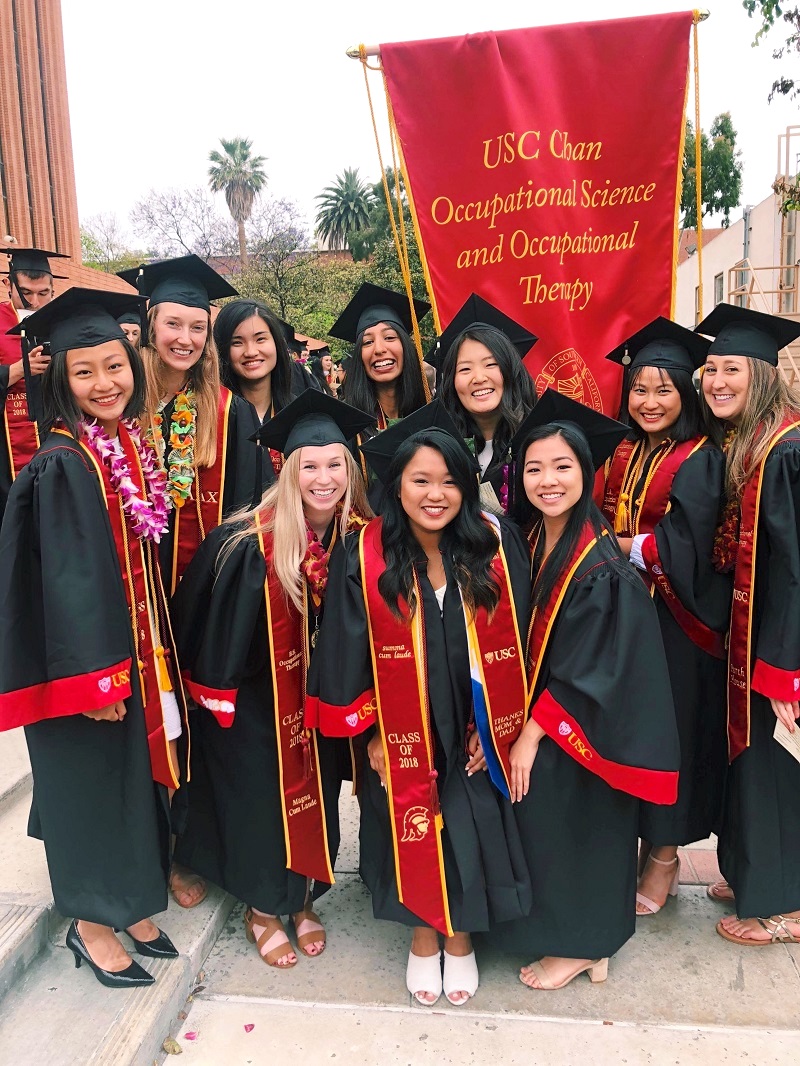
Last fall, I began my OT grad school journey with the mental health immersion and I loved being exposed to areas of OT I had never seen before, such as in forensic mental health. At times, I felt overwhelmed by exams, quizzes, and projects but this summer I was able to reconnect with the reason why I am pursuing OT: to help others.
This past summer, I completed my Level II Fieldwork at Rush University Medical Center in Chicago, IL. When deciding where I wanted to do my fieldwork, I chose to go out of area to explore a new city for the summer. At Rush, I worked on four different inpatient psychiatric units — child/adolescent, general adult, mood disorders, and geropsych. Throughout my Level II Fieldwork, I realized how prepared I was to be an entry-level practitioner from everything I had learned in my classes and previous fieldwork experiences. Since I was able to work with clients across the lifespan, I learned how to rapidly shift the different therapeutic modes I was using based on the client and situation.
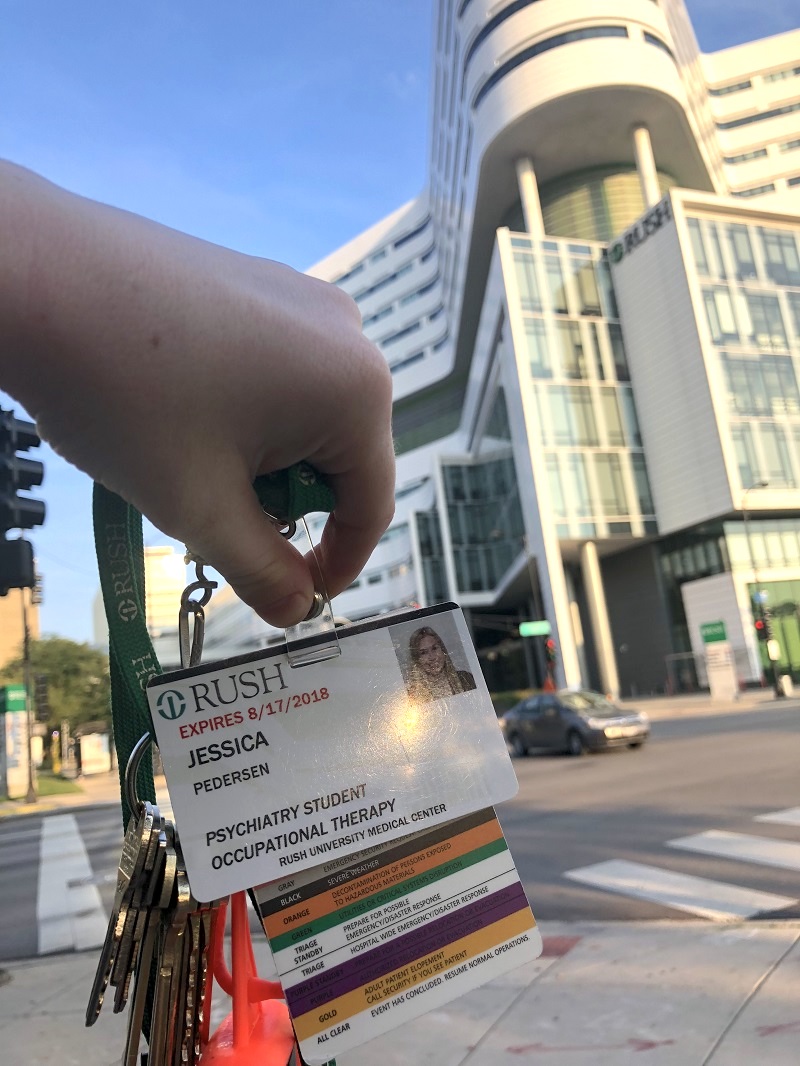
Over the twelve weeks, I gradually gained more independence and eventually was carrying a full caseload where I evaluated 3 patients daily and ran 2 groups. In addition to assessments, treatment plans, individual interventions, group interventions, and progress notes, I was also able to pursue research on OT’s role in medication management in this setting. I loved being able to apply evidence-based practice and see the progress in my clients. Coming back after my fieldwork experience, I feel more prepared and energized to take on my second year!
⋯





